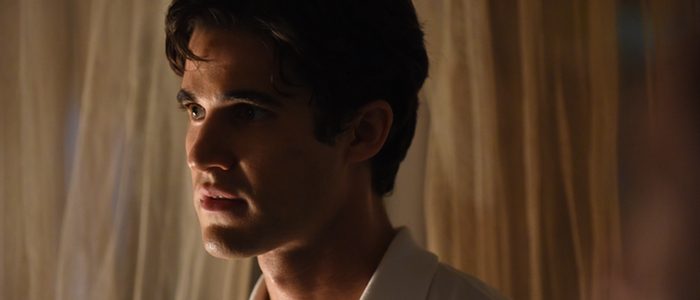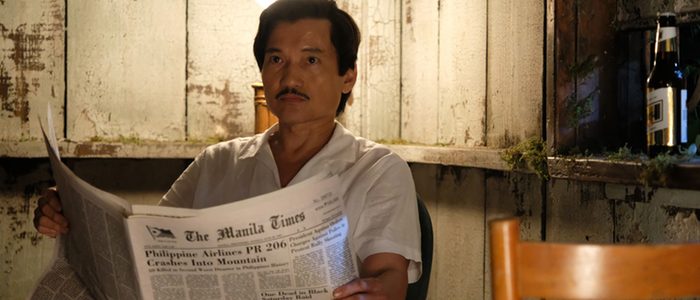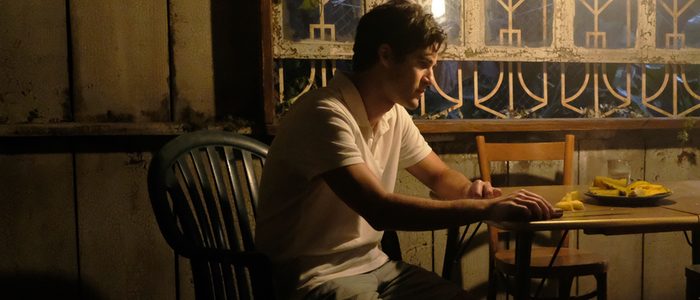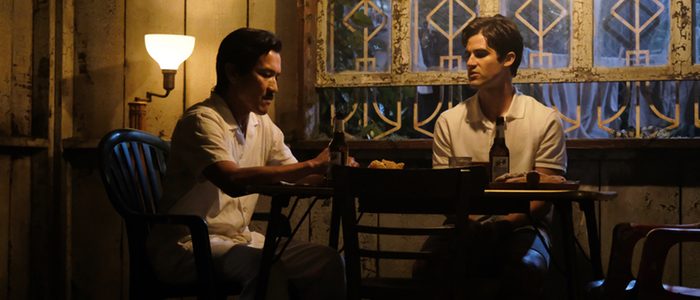'American Crime Story' Review: 'Creator/Destroyer' Shows Us Andrew's Origin Story
1957
The opening of the penultimate episode of The Assassination of Gianni Versace takes us further back in time than we've ever been in the series. It's 1957, and a very young Gianni Versace is trying to learn his place in the world. He's an outsider at school; picked on by teachers, ignored by fellow students. He sits in his mother's dress-making shop and watches her work, a sense of awe and wonder on his face the entire time.
He wants to do what his mother does. And so he does.
While school discourages this desire in Versace, his mother embraces it. If her son wants to be a dress-maker, so be it. She wants to nurture this in the child, and give him the chance to grow.
Yet when she places a pencil in Versace's hand and asks him to design something for her, he instantly gives up.
"I can't," he says. "It's too hard."
It's supposed to be hard, his mother counters. "Success only comes with hard work," she says. "And it takes many years. But that's alright. That's why it's special."
It's clear why this scene is here: to sharply contrast Versace against his murderer Andrew Cunanan even more. Here is the message that no one bothered to instill in Andrew – that success takes time, and that you have to work for it.
1980
It would be inaccurate to say that one event, one specific thing, turned Andrew Cunanan into the sociopathic serial killer he became. That's not how these things work. But while there was no specific trigger, it's clear from "Creator/Destroyer" that Andrew's upbringing certainly didn't help matters. This week, we're provided with more insight into Andrew's life, and it's not pleasant.
As a child, Andrew adores his father, Modesto "Pete" Cunanan (Jon Jon Briones, giving a phenomenal, disturbing performance). Modesto is an immigrant, and he seems obsessed with the concept of making the so-called "American dream" a reality. He moves his family across the country, and sweet-talks his way into a cushy job at Merrill Lynch.
It becomes very clear very quickly that Modesto is a cruel, even violent man. His wife lives in terror of him, and his other children steer clear. Andrew is the only child who receives any sort of warmth from the man, and as a result, he would do seemingly anything to make his father proud.
We watch as the young Andrew interviews to join a fancy school. When asked by the board why he wants to attend the school, Andrew replies, "Because it's the best school in America." When asked who told him that, Andrew says: "My father."
The school board then asks Andrew a seemingly simple question: if he could have one wish, what would it be? Never one for simple answers, he rattles off a list of material things – a house overlooking the ocean, multiple Mercedes'. Here, the school board cuts him off, reminding him that these are multiple things, and what they want to know is what would be his one ultimate wish. Andrew thinks about it for a moment, then replies: "To be special."
Here again is the sharp contrast between Andrew and Versace. Andrew doesn't want to be good at anything; he doesn't want to have talent. He just wants the adulation.
And for a while, he gets it, courtesy of his father. Like when Modesto buys a brand-new car for Andrew, even though Andrew isn't even old enough to drive yet. Thanks to his father, Andrew comes to believe he truly is special. But this feeling won't last forever.
1987
A lot can change in 7 years. After setting up Andrew's "special" childhood, "Creator/Destroyer" jumps ahead 7 years, just as the bottom is about to fall out. Modesto is no longer working at Merrill Lynch. Instead, he's set-up shop in a rinky-dink firm that operates out of a strip mall; the type of establishment that might have popped-up in The Wolf of Wall Street.
Andrew has grown into a cocky, fun-loving 18 year old. He has an older, married lover who buys him gifts and keeps him comfy – but Andrew wants more. He wants to show his lover off to his friends – something the older man wants no part of. "This is strictly on the side," he tells Andrew. It's not that Andrew genuinely cares about this older man; he just wants to show-off. That's the nature of Andrew Cunanan. To brag; to cause a scene. To get attention.
The happiness that Andrew is feeling is about to crumble apart like a sand castle as the tide is coming in. Modesto is busted for fraud – he's been selling non-existent stocks to clueless, elderly people. When the feds come calling, Modesto flees the country – leaving his family behind, and in serious financial trouble. Andrew's mother is understandably worried, telling Andrew that the family has no money, and that Modesto secretly sold their house months ago. But Andrew doesn't want to hear it. He shrugs his mother off, and insists that his father wouldn't leave them in such trouble. He must have a plan. He must have money stashed somewhere. He must.
So Andrew charts a trip to Manila to find his fugitive father. Modesto is living with a relative, bunked out in a shadowy, sweaty shack in the middle of nowhere. He welcomes Andrew with open arms, but the reunion turns sour very quickly. Andrew asks Modesto about any hidden money the family might be able to use. Modesto insists there is money. A lot of it. "Millions," he says.
"Where?" Andrew asks.
"Out of reach," is Modesto's lame answer.
Later that night, however, Andrew gets the truth: there is no money. Andrew is furious and disgusted with Modesto, but Modesto is, in turn, just as disgusted with Andrew.
"You can't go to America and start from nothing," Modesto says bitterly. "That's the lie, so I stole."
"If you're a lie, than I'm a lie," Andrew cries.
"You're not upset that I stole, you're upset that I stopped," his father shoots back. "Now you have to work, for yourself."
In a fit of rage, Andrew brandishes a knife at his father, but backs off, whimpering.
"You don't have it in you," Modesto says, his voice thick with disgust. If only he could see into the future...
That bleak, blood-soaked future is calling. But first, Andrew returns home, defeated, and takes a job at a pharmacy. When quizzed about his family by the pharmacy owner, Andrew does what will soon come very naturally to him: he lies. His father is a success story, he says. And if Andrew's father is a success story, then so is Andrew.
Creator/Destroyer
After spinning its wheels in previous episodes, American Crime Story finally finds its footing again with "Creator/Destroyer." Part of that is due to the direction of actor Matt Bomer. Bomer doesn't just juggle multiple narratives with ease, he also sets up three distinct time periods and locations – the Italy of Versace's youth, the California of Andrew's, and shadowy, humid Manila where Modesto is hiding out. The result is a clear, concise three-act structure that other episodes of this season have been drastically missing.
The other key element of this week's episode is the performance of Jon Jon Briones as Andrew's father Modesto. Briones is incredible here, crafting a truly memorable, truly unsettling character. Because of Modesto's sleazy, cruel nature, we find ourselves empathizing with Andrew ever-so-slightly. It's hard to have any sympathy for Andrew, since we know what a destructive monster he eventually becomes. But seeing his childhood, and watching his interactions with Modesto, we can at least begin to understand some of Andrew's behavior.
Now that we've gone as far back into Andrew's life as we can possibly go, there's only one place American Crime Story: The Assassination of Gianni Versace can go: back to the future. Back to the aftermath of Versace's murder. The event that launched us on this violent, unsettling journey through the life of Andrew Cunanan. The end is near.




